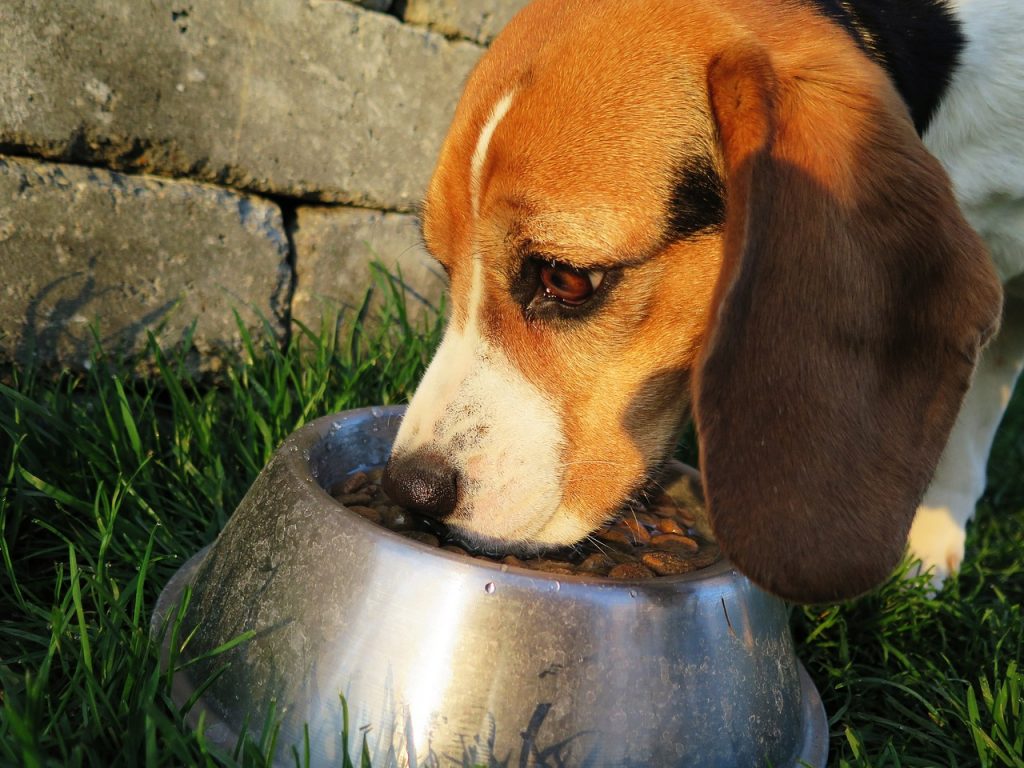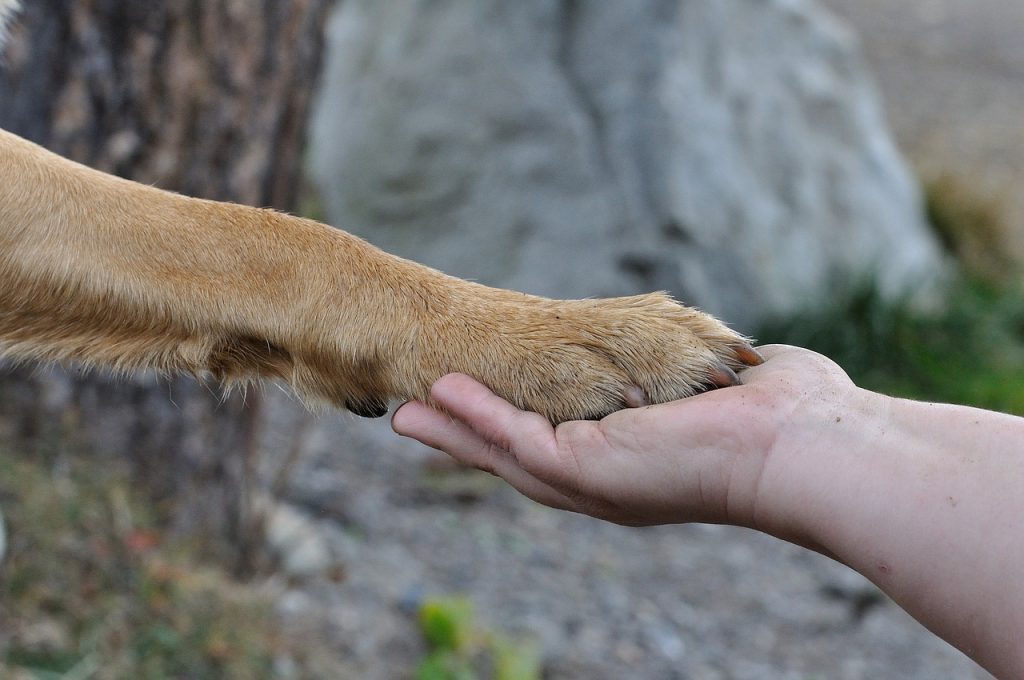Castor Oil for Your Pet is a great alternative method to help combat external skin conditions naturally and effectively for your lovable companion.
Today’s guest post from Summer is all about castor oil for pets. I hope you enjoy the article! Please share thoughts and comments with me below.
Last updated: [last-modified]
As a long-time pet owner, I know what it’s like to have a beloved pet prone to skin irritations. As a pet owner, you may also commiserate in battling different skin conditions as well. While most skin problems prove to be harmless, they can also leave you baffled in how to combat them long-term.
Castor oil is a well-known holistic alternative that has helped many people combat everyday skin conditions. This natural substance can also assist your pet in dealing with their own skin issues. Here is an in-depth breakdown at the benefits in using castor oil for your pet, for both cats and dogs.
A Common Yet Exhausting Problem
While many of these skin conditions are minor, they still prove to be quite a nuisance. As a human who has sensitive skin myself, I have seem to found a counterpart in my dog who also suffers from flaky, dry and irritated skin.
I own a Shetland Sheepdog (sheltie for short) who gets patchy, irritated spots in various areas of her body. While the vet prescribes medication that has proven helpful, it won’t solve the long-term problem.
Many skin conditions are life-long battles for dogs, and taking medication forever is not worth the internal sacrifice. Medications can take a toll on their livers (just like us humans), and that is not a risk I want to take on my pet.
Castor Oil: A Safe Alternative
After searching Google for answers, you either come out more confused or downright scared. After all, all you want is a product that is safe but also effective. While skin irritations are common, they can be uncomfortable and endless battles for us pet owners.

Castor oil is a natural substance whose purpose is as genuine as its makeup. Derived from the seeds of the Ricinus communis plant, castor oil is rich in fatty acids. Due to its undecylenic acid properties, castor oil can assist in fighting many skin conditions such as fungal diseases, dry spots, and uncomfortable itches.
Castor oil is highly viscous, or thick, in its consistency. The thickness helps penetrate deep into the pores of the skin, enriching it with natural fatty acids. This can be instrumental when dealing with a dog or cat whose dry patches even leave you feeling itchy.
As a result of this deep enrichment, castor oil can also stimulate the circulation of blood vessels and lymph nodes. The process helps clear out the bacteria and other toxins that are plaguing the lymphatic system. In the end, both your internal and external body extremities will benefit from the use of castor oil.
Castor Oil for Your Pet: What Will It Accomplish?
Now that you know just some of the benefits that castor oil can do, here are a few specific examples of how castor oil can help your beloved furry companion:
- Combats skin conditions such as dry patches or fungal issues
- Alleviates skin irritations from allergies
- Boosts immune system and circulation
- Acts as a natural anti-inflammatory
In some cases, when utilized with essential oils, castor oil is effective in reducing external cysts, warts, and other bodily growths.
What’s the Best Way to Use It?
The first and most imperative thing to remember when administering castor oil for your pet is to ONLY use it externally. Since dogs have a different chemical make-up and digestive process, they take differently to certain foods and herbs.

Surprisingly, dogs have a much more sensitive stomach than humans. Castor being already dangerous to humans, no need to tell you that one should never risk giving castor oil orally to their pet.
Be sure to watch when applying it externally as well. Dogs can still have a sensitivity to the oil and not take well to its application. Keep an eye out for the following symptoms to know if the castor oil is affecting your pet negatively:
- Diarrhea
- Vomiting
- Dizziness
- Weakness
If your pet experiences any of the above issues, be sure to not apply any more castor oil. While it may a rare occurrence that these happen when applying externally, it still important to take note of them beforehand.
A Natural Remedy
You have nothing to lose by trying castor oil for your pet. The natural properties of this substance definitely prove to have positive outcomes and experiences for those who use it.
The benefits of this holistic method will help your animal feel and look better over time. In comparison to the long-term effects of medication, castor oil is a much safer and healthier alternative by far. As the pet owner, you just have to decide what you feel more comfortable in using.

Pets are family and deserve the best and safest measures in tackling their skin problems. Their unconditional love for you will never waver. Show them you feel the same way, and choose a natural method that can help them feel their best and keep them around for a long time.



Castor oil is not a ‘homeopathic alternative’. It is a holistic option, it is an oil. Homeopathy is an entire form of medicine where homeopathic medicines are made through a completely different process.
ahh, I didn’t catch that – updating now!! 🙂
Hi Brittany! Thanks so much for this post. Curious as to when the castor oil dries on the skin, how long after is it save to allow my dog to lick the spot. Let’s say she’s cleaning herself while I’m out and licks the spot treated but it’s been hour(s) later. I just worry she’ll get diarrhea from it. Thanks again for your time and information!
Hi Diana 🙂 Many thanks for your comment! The castor oil, from my experience, doesn’t really “dry” as so much as it gets absorbed by the skin so there might be a little residue left on the spot, but that’s going to be a very little amount to ingest for your pup, so I doubt she will get sick/have diarrhea from it. When applying it, just make sure thoroughly and gently massage in the oil so your doggie isn’t enticed into licking it. Hopefully, she won’t even notice it was there! I hope this helps!!
My border terrier has two watts one at the top of his head another inbetween his eyes would caster oil be any good for Jonathan you Jan
Hi Jan! Watts, as in like skin tags or something? Sorry, I couldn’t find what watts meant and maybe I am just missing something lol. If it’s like a skin tag, mole or anything of annoyance to your pup, then a small drop of castor oil rubbed in can help relieve symptoms or help reduce the size of a skin tag or mole, etc. Just make sure not to get it in his eyes cause it can make vision go slightly blurry cause it’s a viscous liquid (just temporary), and we’re not yet sure if it’s effective or harmful for your pup. I hope this helps, I’m sorry I couldn’t be more specific!
Can I use Castro oil around my dogs eyes and on his head for hair loss from allergies
Hi Shea, thanks for writing. While castor oil is a safe remedy to use on dogs, I would try to avoid applying to close to your pup’s eyes. If you do, make sure, at least, to rub in thoroughly, so no extra liquid can run into the eyes. Best of luck!!
if I’m putting the oil on my dog and he licks it off will he get sick?
It’s possible, but it depends on how much he ingests. It’s really recommended to have your dog wear an inflatable collar or something comfortable if you’re using castor oil on larger areas (for instance, like dry skin). Just monitor your pup and make sure he can’t get to the area where you’re applying the oil.
can I use castor oil to fasten the growth of my dog’s fur?
Hi Angel, yes just like in humans castor oil can help pets in case of hair loss. It’s commonly used for other natural remedies however, such as soothing itchy skin, tumors, leisons, warts, skin tags, etc. It will undoubtedly soften your doggie’s fur and moisturize his skin, but fur growth isn’t going to be very noticeable after only a couple applications. Since dogs can lick most areas, it’s important to massage in the oil to avoid your dog licking it off or otherwise your pup can end up with a bad case of diarrhea, or worse. If it’s for treating hair loss, you could try massaging castor oil on the area 2-3 times a week for at least one month to see if that helps. Thanks for your comment and good luck!
Thank you for a chance to talk with you.
Thanks to you! Best of luck xo
Can you use Castor oil in a dogs eyes. For cataracts. I’ve heard where it’s been used for cataracts.
Hi Kathe! Thanks for your very good question! I struggle with telling people whether castor oil is effective for curing cataracts in humans/pets. It’s tricky because I’ve seen sooo many websites talk about how it can naturally help dissolve them, but only when cataracts are not severe. Doctors will most likely say you need surgery, but castor oil can help mitigate the affects if caught early. I am publishing my article about castor oil for cataracts this morning: https://castoroil-guide.com/castor-oil-for-cataracts
Please do bookmark my blog to circle back around when it’s published! Thanks so much for reaching out. 🙂
My toy poodle has three skin tags and I was wondering if castor oil would help and if so what carrier oil would I use with it?
Thank You
Hi Maria, thanks for your question. Sorry to hear about your toy poodle! Where are the skin tags, and do they bother your pup? If not, it’s important not to mess with skin tags on dogs unless they’re causing some discomfort. I don’t think castor oil will be effective if you’re thinking about removing the skin tags. If the skin tags are itchy, however, then castor oil may be a way to soothe the discomfort temporarily (is it caused by a collar)? There are many factors that can cause skin tags, including (but not limited to) too much/not enough bathing, tight collars, environmental factors, hygiene, poor diet, and more. The best advice I can give is to see a vet. They will be able to determine whether the skin tags are harmless, or if they should be removed. Thanks again and best of luck!
How often should i put castor oil on my puppy? 🙂 i’ve been putting it on him, however i’m becoming impatient with the results. He had patches, before it was bleeding and had wounds from scratching, when i applied the crysting decreased, wound decreased. Howver i’m worried about the hair loss. It looks like it’s crawling, before it was just his ears now it looks like it’s travelling across his head. Please help me 🙁
Hi Jicelle! So sorry to hear your pup is not feeling so well with his skin 🙁 If I were you I’d consult a vet, as I wouldn’t recommend putting castor oil on open wounds due to all the scratching. The hair loss could indicate a skin disease, or a severe case of fleas, giving this ‘crawling’ effect. I’ve seen it before and I don’t think only applying castor oil will help solve the issue. It can help relieve painful, itchy skin, but just make sure to avoid areas that he would lick and where wounds have opened. Best of luck.
Is Castro oil good to use on a growth on the side of my pugs paw?
Hi Deb,
What kind of growth do you mean? Is it just like a wart or is it more of a boil/infection? Castor oil is safe on pets for external use. If you apply it, just be cautious that your pug doesn’t lick it off – ingesting it could upset your pug’s stomach and he will end up with a messy case of you know what. Otherwise if you try it, do update me with the results! Thanks and best of luck x